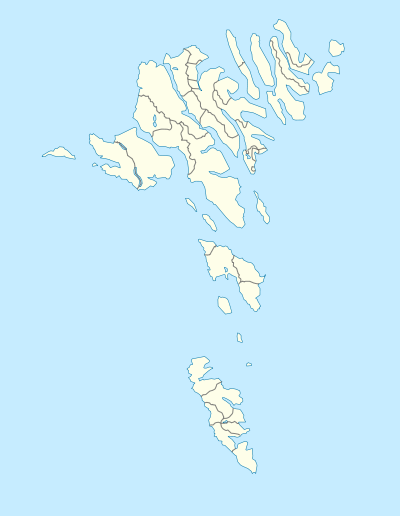Christianskirkjan
| Christianskirkjan | |
|---|---|
|
The front view of Christianskirkjan with its characteristic rose window. | |
 Location within the Faroe Islands | |
| General information | |
| Type | Church |
| Architectural style | Old Norse |
| Location | Klaksvík |
| Country | Faroe Islands |
| Coordinates | 62°13′31.5″N 6°35′12″W / 62.225417°N 6.58667°W |
| Elevation | 15 m (49 ft) |
| Inaugurated | 7 July 1963 |
| Cost | £ 200,000 |
| Owner | Church of the Faroe Islands |
| Design and construction | |
| Architect | Peter Koch |
Christianskirkjan (Christian's Church) is a modern church building in Klaksvík, the second-largest town in the Faroe Islands. It was consecrated in 1963. The architect was Peter Koch, a Dane. Aesthetically, it is one of the islands most notable modern buildings in the country.
At the time of construction, the church in Klaksvík awoke much interest in creating a culturally historic foundation for a new style of Faroese architecture in that, among other things, it used building materials, such as native basalt and lumbar, as well as a reviving the sod roof as an alternative to the widely used concrete since World War II.
Design

Christian's Church of Klaksvík, which is designed without any towers, is reminiescent of a Faroese wooden church, classical Viking buildings, or Faroese farms. The outer walls are made of basalt blocks, and the long sides of the roof frame are from five unbroken gables. The large window frontage is made in one frame. The bell tower stands somewhat apart from the church building.
The nave is centered around the imposing altarpiece of the Great Banquet, which is seven meters high. The painting had existed long before the church was built. Peter Koch is said to have made the painting his centerpiece in designing the church. It was created by the Danish church artist Joakim Skovgaard in 1901 as a fresco for the cathedral church in the Danish city of Viborg. Due to the moisture of the walls of the cathedral church, there was the risk that the piece could be destroyed. It was therefore put on canvass in 1910 and placed in the National Museum of Denmark so that it would later be made available to Koch for Christian's Church.
The stained glass in the rose window was created by Danish artist Ulrikke Marseen. The design depicts Christ as the one who bears the weight of the world. This Gothic piece harkens to the ruins of the Magnus Cathedral in the Faroese village of Kirkjubøur. The baptismal font is made of granite and is also Danish. It is about 4,000 years old and was originally a pagan offering vessel. It comes from a ruin of a church in North Sealand and was gifted to the church by the National Museum of Denmark.
The organ has 29 stops and was built in 1974 by Jensen & Thomsen in Hillerød, Denmark. From the roof beams hangs a Färöboot, an eight-person áttamannafar (a boat specific only to the Faroe Islands). This was the last boat to be built for the rectory in Viðareiði. The boat was sold to Fugloy in 1912 and was one of the boats which was out at sea on the day before Christmas in 1913 for fishing - on the calamitous day on which several boats went missing, including boats from Skarð. All adult men from the village perished that night.
Two memorial plaques hang in the church. One bears witness that the church was built in commemoration of the Farese fishermen and sailors who, sailing as civilians, lost their lives during occupation in the World War II. The other plaque reports that the church was built in memory of the Danish King, Christian X, who gave the church its name, Christian's Church.
One of the "Seven Faroese Wonders"
At the Ólavsøka Festival in 2007, the Faroese television company, Kringvarp Føroya, announced a nationwide contest for the "Seven Faroese Wonders“, by which the audience would recommend their favorite buildings and other things around the country. A series of eight winners (as two were in a tie) were not announced, but Christian's Church is among them. The others are the pews in the Kirkjubøur Church, the Magnus Cathedral, the Nordic House in the Faroe Islands, Tinganes, the Norðoyatunnilin tunnel, the first Flag of the Faroe Islands in the Church of Fámjin, and the Seat of the List of Danish High Commissioners in the Faroe Islands (the last two being tied).[1]
See also
References
- ↑ portal.fo: Føroyingar hava valt síni undurverk ("Die Färinger haben ihre Wunderwerke gewählt"), 28. Juli 2007.
External links
- Christianskirkjan at the website of the Church of the Faroe Islands
- Christianskirkjan at visitnordoy.fo
Coordinates: 62°13′32″N 6°35′12″W / 62.2256°N 6.5868°W